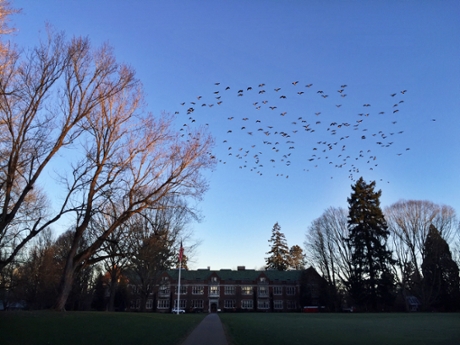
IRIS login | Reed College home Volume 96, No. 2: June 2017
Reed Opposes Immigration Ban
Reed President John R. Kroger today announced that Reed will ask Secretary of Homeland Security John Kelly to review President Trump’s executive order banning immigration from seven majority-Muslim nations in the Middle East.
In a message to the Reed community, Kroger said that the order “deeply offends” the values of the Reed community and is in direct conflict with Reed’s commitment to educate thinkers from a broad range of nations, faiths, and races.
As a practical matter, he said, the order will make it “difficult, and in many cases impossible,” for students and scholars from the seven nations to attend or teach at Reed and will have a “chilling effect” on the ability of students and scholars to travel to the region.
It is highly unusual for a Reed president to make an official pronouncement on a political issue; Reed has a longstanding tradition of maintaining political neutrality in order to safeguard academic freedom on campus. But the doctrine of neutrality does not apply to issues with a direct bearing on Reed’s educational mission. “I think we are at that juncture today,” Kroger said.
Kroger will join other college presidents on the American Council on Education in conveying “our deep concerns” about the order to the Trump Administration. Kroger will also express his concerns to Oregon’s congressional delegation.

Professors, students, and staff write messages of support for the Muslim community at a rally in Hauser Library.
Students, professors, and staff held a rally to support the Muslim community on Tuesday.
Here is the full text of Kroger's message:
Dear Reed students, staff and faculty:
As we all know, the new presidential administration has launched sweeping changes in United States policies respecting foreign affairs, trade, immigration, health care, and other matters. I expect more changes will follow. Many of these changes have significant impacts on Reed and our community members. In light of that, I want to share some thoughts about the ways the college will engage with these matters in the coming years.
As a matter of long tradition, Reed has encouraged individual members of the community and community groups to engage in political discourse and political activities but, as a matter of policy, has declined, as a college, to adopt political positions or endorse a particular political position on any issue that does not directly affect the fulfillment of our educational mission. This position reflects our commitment to intellectual and academic freedom. It has long been thought that if Reed adopted particular political positions not directly related to our mission, students and scholars who do not share those beliefs would decline to engage with or join our community, undercutting our commitment to broad and free exchange of ideas, no matter how controversial or unpopular. I think this position is wise.
Reed College does, however, adopt and seek to advance policy positions that support our educational mission and opposes those policies, national or local, that undercut or threaten that mission. I think we are at that juncture today.
The recently announced executive order on immigration will make it difficult, and in many cases impossible, for students and scholars from the seven identified nations, all predominantly Muslim, and currently not in the US, from attending, teaching or lecturing at Reed and other American colleges and universities. This is in direct conflict with our desire to bring together at Reed thinkers from a broad range of nations, faiths and races to pursue shared intellectual passions and exchange their ideas. It also deeply offends Reed community values with respect to tolerance, religious freedom, human dignity, and freedom to travel. Recent comments by a ranking administration official that U.S. travelers to these nations may also be subject to heightened scrutiny will also have a deep chilling effect on the ability and desire of students and scholars from Reed and other institutions to travel to these nations to conduct research, and thus will impoverish our understanding of and intellectual exchange with these areas of the world.
Accordingly, Reed has joined this week with other colleges and universities of the American Council on Education to express to the Administration our deep concerns with the new immigration policy and our commitment to academic freedom. Later this week, I will be sending a letter to members of Oregon's Congressional delegation expressing our views as well.
In addition, we will, as a matter of course, monitor further changes in national policies and will express our views if and when it is necessary to protect our educational mission. I do not want to speculate on what additional changes might require this response, but I will say that Reed is deeply committed to civil rights for all persons, regardless of race, faith, creed, national origin, ethnicity, or sexual orientation, and that we will support progressive financial aid policies and civil rights laws like Title IX that promote equal access to higher education.
Respectfully,
John R. Kroger
President



LATEST COMMENTS
steve-jobs-1976 I knew Steve Jobs when he was on the second floor of Quincy. (Fall...
Utnapishtim - 2 weeks ago
Prof. Mason Drukman [political science 1964–70] This is gold, pure gold. God bless, Prof. Drukman.
puredog - 1 month ago
virginia-davis-1965 Such a good friend & compatriot in the day of Satyricon...
czarchasm - 4 months ago
John Peara Baba 1990 John died of a broken heart from losing his mom and then his...
kodachrome - 7 months ago
Carol Sawyer 1962 Who wrote this obit? I'm writing something about Carol Sawyer...
MsLaurie Pepper - 8 months ago
William W. Wissman MAT 1969 ...and THREE sisters. Sabra, the oldest, Mary, the middle, and...
riclf - 10 months ago